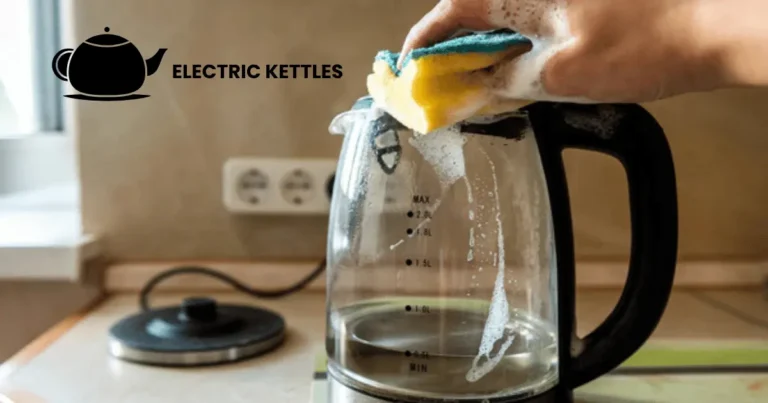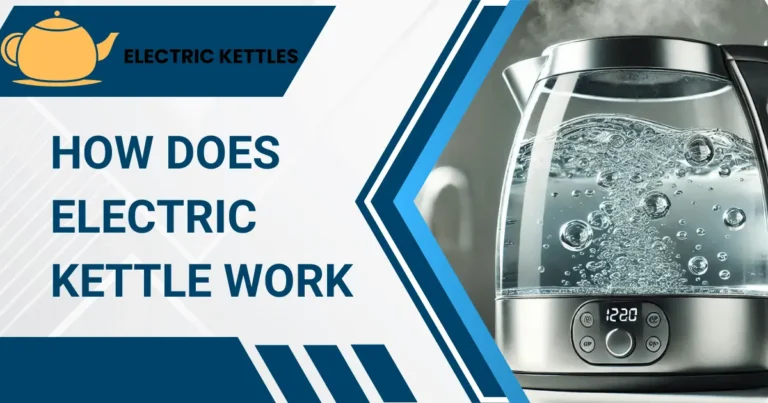Why Has My Electric Kettle Gone Noisy
Electric kettles often make noise as they heat water, but some noises can be unusual. A gentle hum or bubbling sound is normal as water heats up. However, loud rattling, hissing, or clicking sounds might signal an issue. These sounds can vary depending on the kettle’s age, condition, and design.
Unusual noise can mean there’s a problem, like mineral buildup or a loose part. Knowing the cause helps you take the right steps to fix it. Regular care can keep your kettle working well and make it quieter. Proper maintenance also extends its life, so it’s worth learning what each sound might mean.
Table of Contents
Causes of Noisy Electric Kettles
There are several reasons why electric kettles can become noisy over time.
Mineral Buildup
When water is heated, minerals like calcium and magnesium can settle on the heating element, forming a hard, chalky layer. This buildup disrupts the heating process and can lead to loud boiling and popping sounds. Regular descaling, especially if you have hard water, helps remove these deposits and keeps the kettle quieter.
Heating Element Issues
The heating element inside the kettle undergoes wear over time, especially in kettles used frequently. A worn or damaged heating element can produce unusual sounds, like buzzing or rattling, which may indicate the need for repair or replacement. Older kettles are especially prone to these issues, as parts weaken with age and frequent use.
Normal Boiling Process
Some level of noise is natural when the water heats and starts boiling, due to bubbles forming and moving through the water. However, if this sound becomes loud or irregular, it may suggest issues like mineral buildup or structural wear, which can amplify regular boiling sounds.
Water Quality
Hard water, which has a high concentration of minerals, tends to increase kettle noise during heating. These minerals interact with the heating process, making the boiling sound harsher. Using filtered or softened water can reduce noise, as well as help prevent mineral buildup, making for quieter operation over time.
Impact of Water Quality on Kettle Noise
Hard Water and Mineral Content
Hard water has high levels of minerals, especially calcium and magnesium, which tend to settle on the kettle’s heating element as it heats. This creates a layer of limescale, which interrupts the heating process and can lead to popping or crackling sounds. The more minerals present in the water, the more likely this buildup will occur, and the louder the kettle may become over time.
Limescale Buildup and Noise
The mineral deposits from hard water form limescale, a chalky layer that clings to the heating element. This layer disrupts heat transfer, making the kettle work harder and producing extra noise. Limescale buildup can worsen with time if the kettle is not descaled regularly, leading to increasingly loud boiling sounds.
Filtered or Softened Water
Using filtered or softened water can reduce these sounds by preventing the minerals that cause buildup. Filtered water has fewer minerals, which results in less limescale forming on the heating element. This can make the kettle’s boiling process quieter and more efficient.
Benefits of Regular Maintenance
Regularly descaling your kettle, especially if you live in an area with hard water, helps prevent limescale buildup and reduces noise. Cleaning with descaling solutions or vinegar keeps the heating element clear, improving performance and prolonging the kettle’s life.
How to Reduce Noise in Your Electric Kettle
Regular Descaling
Descaling is essential to prevent mineral buildup, especially if you use hard water. Using a descaling solution or a mixture of vinegar and water helps remove limescale from the heating element. This reduces crackling and popping noises, making the kettle quieter and more efficient over time. Descaling once a month is usually effective in reducing noise.
Use Filtered or Softened Water
Filtered water contains fewer minerals, reducing the chance of limescale forming on the heating element. This minimizes the noise caused by mineral deposits during boiling. For those in hard water areas, using a water filter can significantly lower noise levels and extend the kettle’s life by preventing buildup.
Check for Loose Parts
Loose components inside the kettle, like the lid or handle, can also contribute to noise. Checking for and tightening any loose parts can help avoid rattling sounds. If the noise persists, consider consulting the manual or reaching out to the manufacturer for assistance with any replaceable or fixable parts.
Invest in a Quality Kettle
Higher-quality kettles often have noise-reducing designs, like insulated walls and better heating elements. Investing in a kettle known for quiet operation can be worthwhile if you’re sensitive to noise. Some models are specifically designed for quieter operation and may come with features like double-wall insulation to reduce boiling sounds.
When to Consider Replacement or Repair
Persistent Unusual Noises
If your kettle continues to make loud or unusual sounds, even after cleaning and descaling, it may indicate a deeper issue with the heating element or internal components. Constant rattling, clicking, or buzzing often suggests wear or damage that may require professional repair or replacement.
Visible Wear or Damage
Over time, kettles can show signs of wear, like cracks, rust, or loose parts. If the kettle has visible damage, especially around the heating element or on the electrical cord, it’s best to stop using it. A damaged heating element or cord can pose safety risks, making replacement the safer option.
Frequent Malfunctions
If your kettle frequently stops mid-boil, fails to heat properly, or doesn’t turn off automatically, these malfunctions could indicate electrical or mechanical issues. Such problems may be fixable, but in older kettles, replacement is often more cost-effective and safer, especially if the model lacks updated safety features.
Consider the Cost-Effectiveness
When repair costs are close to or exceed the price of a new kettle, replacement may be the more practical choice. Modern kettles often come with improved features like energy efficiency and quieter operation, making an upgrade beneficial. Replacing an older or malfunctioning kettle can also save on long-term repair costs and improve your experience.
Conclusion
A noisy electric kettle can be frustrating, but understanding the causes can help you fix it. Often, noise comes from mineral buildup, water quality, or worn parts. Regular cleaning and using filtered water can reduce these sounds. Simple steps like descaling your kettle can make a noticeable difference in noise levels and keep your kettle working smoothly.
If the noise continues despite these efforts, it might be time to repair or replace the kettle. Persistent loud sounds or visible damage often signal deeper issues. Choosing a quieter, higher-quality kettle can improve your experience and bring peace of mind.







